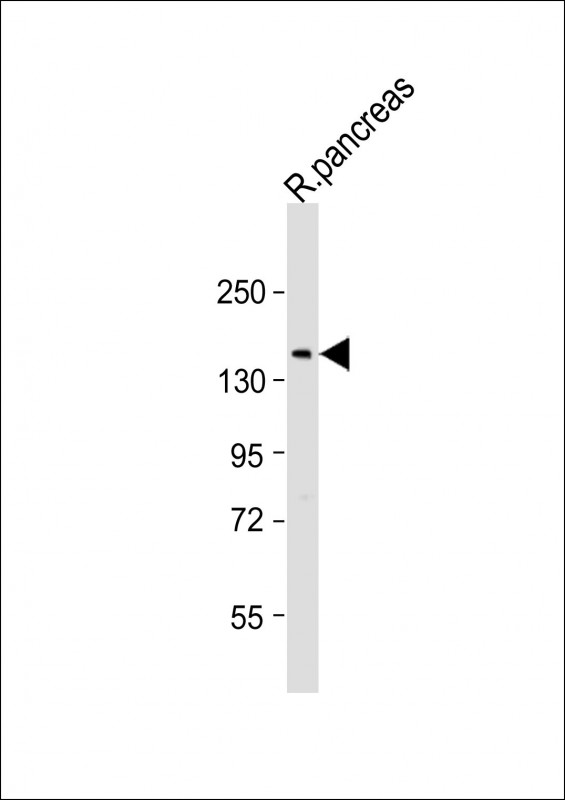
| WB | 1/2000 | Human,Mouse,Rat |
| IF | 咨询技术 | Human,Mouse,Rat |
| IHC | 咨询技术 | Human,Mouse,Rat |
| ICC | 技术咨询 | Human,Mouse,Rat |
| FCM | 咨询技术 | Human,Mouse,Rat |
| Elisa | 咨询技术 | Human,Mouse,Rat |
| Aliases | Deleted in malignant brain tumors 1 protein, Glycoprotein 340, Gp-340, Hensin, Salivary agglutinin, SAG, Surfactant pulmonary-associated D-binding protein, DMBT1, GP340 |
| Entrez GeneID | 1755 |
| WB Predicted band size | 260.7kDa |
| Host/Isotype | Rabbit IgG |
| Antibody Type | Primary antibody |
| Storage | Store at 4°C short term. Aliquot and store at -20°C long term. Avoid freeze/thaw cycles. |
| Species Reactivity | Human, Rat |
| Immunogen | This DMBT1 antibody is generated from a rabbit immunized with a KLH conjugated synthetic peptide between 2160-2192 amino acids from human DMBT1. |
+ +
以下是关于DMBT1抗体的3篇参考文献,包含文献名称、作者及摘要概述:
---
1. **"DMBT1. a novel member of the SRCR superfamily, is a candidate tumor suppressor gene on 10q25.3-26.1"**
*作者:Mollenhauer J, et al.*
**摘要**:该研究首次克隆并鉴定了DMBT1基因,发现其在多种恶性肿瘤中缺失,推测其具有抑癌功能。研究通过抗体检测DMBT1蛋白在正常组织与肿瘤中的表达差异,证实其在黏膜免疫和上皮屏障中的关键作用。
---
2. **"DMBT1 expression is linked to immune response in salivary gland tumors"**
*作者:Bikker FJ, et al.*
**摘要**:利用DMBT1特异性抗体进行免疫组化分析,发现唾液腺肿瘤中DMBT1蛋白的表达与局部免疫细胞浸润相关,提示其可能通过调节先天免疫反应影响肿瘤微环境。
---
3. **"Antibody-based validation of DMBT1 as a biomarker for inflammatory bowel disease"**
*作者:Holmskov U, et al.*
**摘要**:研究通过多克隆抗体验证DMBT1在炎症性肠病(IBD)患者肠道组织中的表达显著下调,表明其可能作为黏膜修复和炎症调控的生物标志物,并为诊断提供潜在靶点。
---
这些文献涵盖了DMBT1抗体的基础研究、肿瘤免疫调控及临床诊断应用方向。如需具体年份或DOI,可进一步补充检索。
The DMBT1 (Deleted in Malignant Brain Tumors 1) antibody targets a protein encoded by the *DMBT1* gene, which is implicated in innate immunity, epithelial differentiation, and tumor suppression. DMBT1. also known as gp340 or salivary agglutinin, is a secreted glycoprotein belonging to the scavenger receptor cysteine-rich (SRCR) superfamily. It plays roles in pathogen recognition, mucosal defense, and cell adhesion through interactions with bacteria, viruses, and host molecules like surfactant proteins.
DMBT1’s tumor-suppressive function was initially identified due to its frequent deletion in brain, lung, and gastrointestinal cancers. Its loss or downregulation is associated with poor prognosis, suggesting its involvement in cancer progression and metastasis. Antibodies against DMBT1 are widely used in research to study its expression patterns in tissues, its interaction with pathogens, and its potential as a biomarker for cancer or inflammatory diseases.
These antibodies enable detection via techniques like Western blot, immunohistochemistry, and ELISA, aiding investigations into DMBT1’s dual role in immunity and oncogenesis. Cross-reactivity studies highlight its conservation across species, including homologs like CRP-ductin in mice. However, functional diversity due to alternative splicing and glycosylation complicates antibody specificity, necessitating careful validation. Overall, DMBT1 antibodies remain vital tools for unraveling its contributions to mucosal health, disease mechanisms, and therapeutic targeting.
×